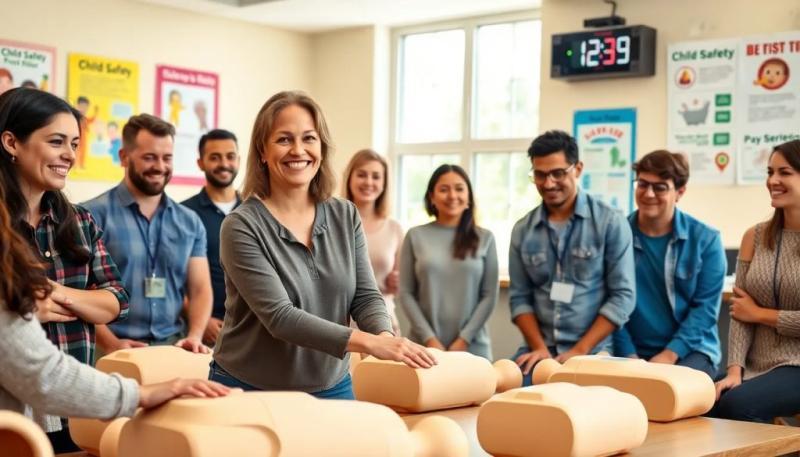If you're looking to enhance your babysitting skills, understanding the best babysitter CPR classes near me is essential. These classes not only provide vital life-saving techniques but also boost your confidence as a caregiver. In this article, we will explore various aspects of babysitting certification and the benefits of being a certified babysitter.
With an increasing demand for skilled babysitters, knowing where to find the right training can set you apart. From necessary certifications to the types of courses available, this guide will help you navigate your options effectively.
What are the best babysitter CPR classes near me?
Finding the best babysitter CPR classes near me can significantly impact your effectiveness as a babysitter. Many organizations offer tailored courses designed to meet your needs. The American Red Cross, for instance, provides comprehensive CPR and First Aid training, which is crucial for babysitters.
These classes often include hands-on practice with CPR techniques and emergency response scenarios that ensure you're prepared for any situation. Additionally, many local community centers and YMCAs offer babysitting courses that include CPR training as part of their curriculum.
- American Red Cross: Offers various babysitting and CPR courses.
- YMCA: Features babysitting classes that include First Aid and CPR certification.
- Community colleges: Many offer affordable courses for aspiring babysitters.
- Online platforms: Websites like Udemy and Coursera also provide CPR training.
It's essential to check the credentials of the instructors and the content of the course to ensure you're receiving quality training that meets industry standards.
How to find babysitting classes near me?
Finding babysitting classes nearby can be straightforward if you know where to look. You can start by searching online for babysitting classes near me and filtering the results based on your location. Websites like the American Red Cross offer a searchable map for locating courses in your area.
Additionally, community centers and local YMCAs often advertise their classes on social media and community bulletin boards. It's also a good idea to ask friends or family for recommendations, as personal experiences can guide you to quality programs.
- Search on Google or Bing for “babysitting classes near me.”
- Check local YMCA and community centers.
- Visit the American Red Cross website for course locations.
- Look for online options if in-person classes aren't available.
Lastly, consider joining local parenting or childcare forums online. These communities often share valuable information about where to find reputable babysitting courses.
What are the benefits of babysitting certification?
Obtaining babysitting certification offers numerous benefits. Firstly, it enhances your credibility as a babysitter. Many parents prefer hiring certified babysitters because it indicates a level of commitment to their children's safety and well-being.
Moreover, certified babysitters often command higher rates compared to those without certification. This can significantly increase your earning potential in the long run. Additionally, the skills learned during certification courses, such as emergency preparedness and First Aid, are invaluable, giving you the confidence to handle various situations.
- Increased employability: Certified babysitters are more desirable to parents.
- Higher earning potential: Certifications can justify higher rates.
- Enhanced skills: Learn vital emergency response techniques.
- Networking opportunities: Meet other caregivers and professionals.
Training also allows you to provide a safer environment for children, which is a priority for any babysitter. This aspect of care is often what parents appreciate the most.
What is included in babysitting courses?
Babysitting courses typically include a variety of topics designed to prepare you for real-life scenarios. Most programs cover essential childcare skills, including basic child development, safety practices, and emergency response techniques.
Courses often integrate interactive components, such as role-playing and hands-on practice, to engage participants fully. Here are some common elements found in babysitting courses:
- Child development basics: Understanding age-appropriate activities and behaviors.
- Safety and emergency preparedness: CPR, First Aid, and how to handle emergencies.
- Effective communication: How to interact with children and parents.
- Basic household management: Learning how to manage time effectively while babysitting.
Additionally, some courses offer certifications that can enhance your resume, making you a more competitive candidate in the job market.
Where to locate Safe Sitter® programs?
Safe Sitter® programs are specifically designed to equip young caregivers, typically aged 11-14, with the skills they need to babysit safely. These programs are widely available across the United States and can be found through various channels.
The American Red Cross and local community centers often host Safe Sitter® courses. You can easily locate a program by visiting the Safe Sitter® website, which features a search tool to find classes based on your location.
- American Red Cross: Comprehensive Safe Sitter® courses.
- Local community centers: Often hold regular classes.
- Schools: Some may offer Safe Sitter® training as part of after-school programs.
Participating in a Safe Sitter® course can enhance your babysitting capabilities and prepare you for the responsibilities involved in caring for children.
What are the requirements to become a babysitter?
While becoming a babysitter doesn't require formal education, certain skills and qualifications can enhance your employability. Most parents look for candidates who have completed a babysitting or CPR certification course.
Additionally, having previous experience with children, whether through family, volunteering, or formal babysitting, can be a significant advantage. Strong communication skills and the ability to manage time effectively are also crucial when caring for children.
In many cases, babysitters will also need to obtain a background check, especially if they are applying for positions through agencies. Being prepared with references from previous families can also help secure a job.
Related questions about babysitting certification
Frequently asked questions about babysitting certification
What CPR certification do babysitters need?
Babysitters should aim for a CPR certification that covers infant and child CPR techniques. The American Red Cross offers a comprehensive course that is specifically tailored for caregivers. This certification not only teaches the correct techniques but also emphasizes the importance of recognizing emergencies and responding appropriately.
Many parents prefer babysitters who hold this certification as it demonstrates a commitment to safety. Having an up-to-date CPR certification can also make you more competitive in the job market.
How much money do you get for being a certified babysitter with CPR?
The rates for certified babysitters can vary based on location, experience, and the number of children being cared for. On average, a certified babysitter with CPR training can earn anywhere from $15 to $25 per hour. Those with additional skills or specializations may command higher rates.
Parents often value certification highly, which can justify your asking price. Moreover, having CPR certification can be a significant factor in being selected over non-certified candidates.
Should babysitters know CPR?
Yes, babysitters should know CPR. Understanding how to perform CPR can be the difference between life and death in an emergency. Parents prefer babysitters who have this knowledge, as it indicates a higher level of preparedness and responsibility.
Courses that include CPR training, like those offered by the American Red Cross, equip babysitters with the necessary skills to respond in urgent situations. This not only enhances the safety of the children in your care but also increases your confidence as a caregiver.
Do you need certifications to be a babysitter?
While certifications are not legally required to become a babysitter, they are highly recommended. Completing a babysitting course and obtaining CPR and First Aid certifications can significantly bolster your chances of getting hired. Many parents specifically look for babysitters who have proven their commitment to safety and education through certifications.
In summary, while you can technically babysit without any formal training, certifications provide you with valuable skills and increase your marketability.
En este sentido, te invitamos a ver un video que explora las mejores clases de RCP para niñeras cerca de ti, donde encontrarás información valiosa y recomendaciones.



